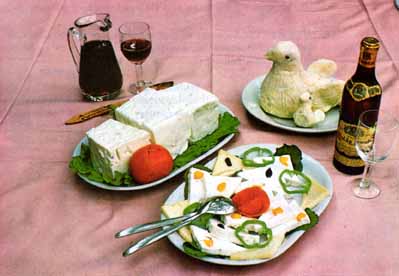
TURKISH WHITE CHEESE - Beyazpenir
SOME DETAILS ABOUT THE INGREDIENTS
CUMIN in powder form is mostly used to flavour meat, particularly "kofte."
DILL - These fine branches are used like parsley to decorate dishes, and also to enhance them with their aroma and special taste. Where dill cannot be found, parsley can be used.
STARCH in powder form, whether from corn, wheat, or potatoes, is often used in cooking to thicken a sauce or a cream. Gelatin can be used instead if desired.
OLIVE OIL is used very frequently in the preparation of Turkish food. You'll find it in cold dishes, salads, cooked vegetables, and pastries.
The ONION can be found in most Turkish dishes. For salads, the onion leaves are crushed by hand, sprinkled with salt and rinsed to remove the bitter taste.
OILED PAPER - A heavy oil-treated paper, sold in Turkey in large sheets, which are cut to size according to need, and then folded into the shape of a box, or a small bag. This holds meat or fish which are to be broiled or baked in the oven.
PINENUTS are used in rice dishes, desserts and for decorating creams.
CURRANTS are a very small type of raisin that are mainly used in rice prepared in olive oil, but can also be found in various desserts.
SUGAR is not only used in pastries but also in the preparation of dishes cooked in olive oil.
TURKISH WHITE CHEESE is made from sheep's milk. As it's name indicates, it is pure white and found in large, compressed cubes. There is a notable difference between this and French white cheese, which is more like cream. Understandably, in the following recipes, "white cheese" will imply Turkish white cheese. For those who cannot obtain it in Europe, a well dried country cheese mixed with goat cheese will substitute well for it. In America, dry cottage cheese mixed with whole milk will do.

"YUFKA" are large, thin disks of pastry dough used primarily in "borek." You can prepare the "yufka" pastry yourself but it takes a certain experience to obtain the desired thinness. This is why it is often preferable to buy your "yufka" ready made, if possible.
If you want to prepare the "yufka" yourself, you will need an ordinary pastry rolling-pin as well as an "oklava", that is a very thin rolling-pin about 80 cm. long. This is a common utensil in Turkey, but as you may not be able to find one, a broom handle of similar length will do well as a substitute. After rolling the dough with a large rolling-pin until it is as large as a plate, Turkish cooks then gently roll the dough with the "oklava" letting the entire surface of the dough wrap itself around the "oklava." Press the dough with your hands to spread it toward the ends of the "oklava." Now unroll the dough from the "oklava" and repeat the operation from another edge of the dough. Continue until the dough is about 60 cm. in diameter. This is how you can prepare the "yufka" to use in the preparation of "borek" as shown in the third chapter of section two.
| SUBSTITUTING HONEY FOR SUGAR | Seker yerine bal |
For the sake of good nutrition, many people prefer to use natural honey instead of refined sugar. Simply use 2/3 the amount of honey for the amount of sugar indicated, i.e. for 1 kilo of sugar, use 650 grams of honey. For each cup of honey you do use, deduct about 3 soup spoons of liquid from the recipe. (This does not apply to yeast bread.)
In baked goods, add 1/2 coffee spoon of baking soda (bicarbonate of soda) for every cup of honey substituted. Reduce oven temperature slightly and bake a little longer, as honey tends to make baked goods brown faster.